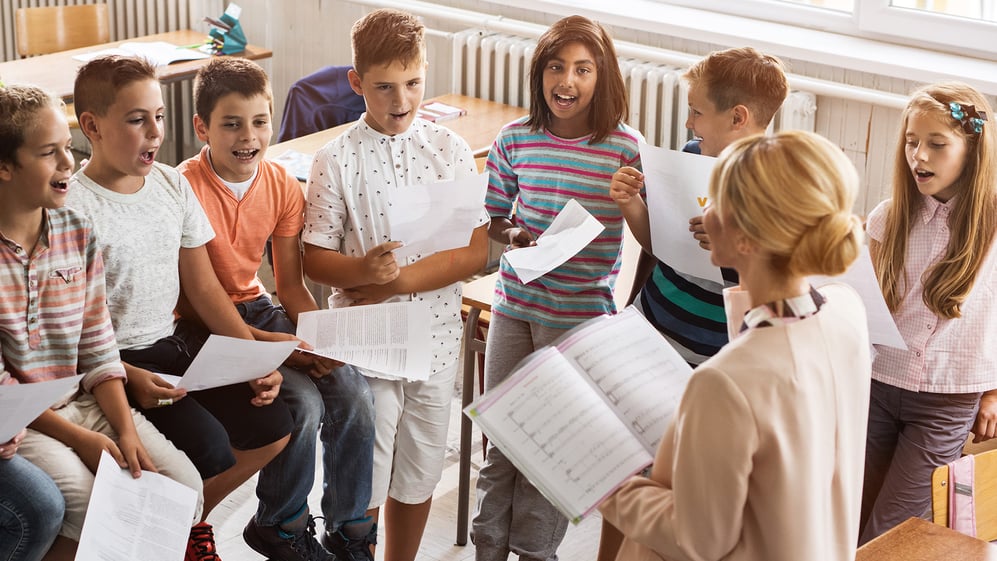Why do we teach music?
It could be the cognitive abilities music education grants students. Or perhaps the emotional well-being it provides. Maybe it’s a way to give at-risk children an outlet and a safe place. Perhaps music education teaches one generation to preserve its culture’s musical heritage. Could it be the higher test scores music students supposedly receive? Or maybe it’s the health benefits, the soothing of minds and bodies with music. What about the memory and learning abilities of music students?
Are these why we teach music?
In my classes of older students, I take a singing attendance, forcing each student to reply with a sung “present” if they are, indeed, present. It’s deliciously uncomfortable and embarrassing for the students, a reality they make known to me in no uncertain terms. So I tell them: the beauty of learning to sing and make music is that it forces you to be courageous, to have grace under pressure. To sing by yourself in a room full of people is no small feat. If you can master that, public speaking is a walk in the park.
Is that why I teach music?
My colleagues and I use songs and jingles constantly in class so that our students can recite every preposition and continent, so they can tell you the function of an adverb and adjective, so they can count by twos, so they can remember the eras of music, so they can recall the meaning of “to love” in every form in Latin.
Is this why we teach music?
Many music-education programs incorporate folk songs from America and other countries into their curriculum. The point is to teach the children the songs of our heritage and of the heritage of those students with families from different countries. We want our children to be patriotic as well as to have an awareness of the culture of foreign lands.
Is this why we teach music?
I’ve heard from most adults who took piano lessons when they were younger that they regret stopping lessons. They wish they had the skills now to enjoy making music and hope that their children will take to an instrument and keep with it. They want their children to enjoy making music and to continue to do so.
Is this why we teach music?
Purpose of Music Education
All of these outstanding reasons to teach music often cause us to wonder why some schools cut back on music education, why some parents have no interest in putting their child in piano lessons, why some people simply do not enjoy most music-making. Don’t they see what music can do? Don’t they see the many benefits of music education?
But that is the point. All of these things are mere benefits of music. Mere side effects that are indeed wonderful things, but not the reason we teach music. Not the purpose of music education. While we hope that music helps children with public-speaking skills, remembering facts, remembering their heritage, and enjoying a skill into adulthood, these are not enough to tell us the purpose of our music-making and our music-teaching.
Glorifying God in Music Education
The purpose of music is to glorify God. It is a gift from Him for us to delight in. The tangible benefits take a back seat to the wonder music instills in us, a wonder that guides us out of the drudgery of our daily lives and into a glimpse of the divine: a glimpse of God Himself.
Can we be surprised, then, when non-Christians give little thought to music, strong music-education programs, or lessons for their children? Are we shocked when our own congregants, who are perhaps ignorant of the purpose of music, take little interest in the music of the Church? The “case for music,” as it were, loses ground when we consider only its tangible benefits instead of its true purpose. As wonderful as the benefits are, they can be provided in many other ways.
Of course, one could argue that many school subjects and other areas of study also glorify God. Why should we give music any special place? Indeed, math, science, history, and literature all give their students a fuller understanding of the world and of God and His work. But music has a unique ability to specifically incorporate God’s Word and provide a way to mediate upon it. Think of hymns, of chanting psalms, of anthems and spiritual songs. All of these take biblical texts or summaries of biblical accounts and proclaim them in a beautiful and memorable way. I think that even music sans text (or sans biblical text) has the special ability to point to the divine. It has a way of drawing our minds to something beyond ourselves, an almost otherworldliness to it.
Beauty and Joy in Music Education
We are only a month into the school year, and I’ve already been stopped in my tracks multiple times by the beauty of my students’ singing. I actually recorded my first graders the other day because even at the end of their long and tiring day, they were singing a hymn with gusto.
This beauty is why we teach music. It is a beauty grounded in God’s Word that gives us a glimpse of heavenly splendor. It is not practical, not necessarily useful in the children’s future careers, but instead leads them to the reason for life itself and to the hope we have for the future, even the future after death. A future in heaven where we will finally have the full vision of God Himself.
And, finally, music is a thing of great joy. Not a fleeting joy based on the quality of one’s circumstances, but rather a joy founded in the One who has taken all of our sorrows upon Himself and has given us hope for the future. Not everyone has this joy, something we certainly see and hear about every day.
And this is why music is essential to our education. To glorify God is to know the joy He has given us. To make music is to look to and proclaim our salvation in Christ.
Check out our library of songbooks to help you start teaching music to every age group and learning level.













